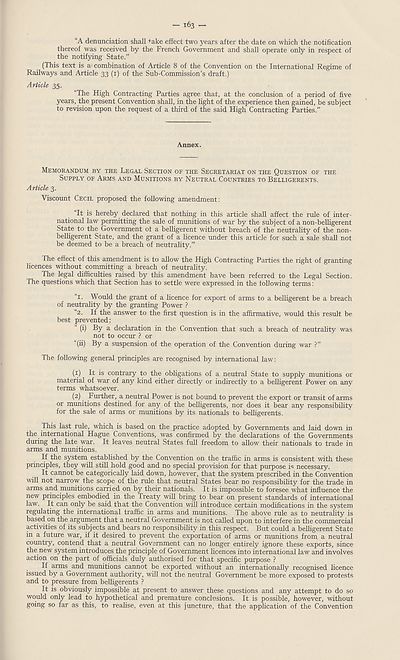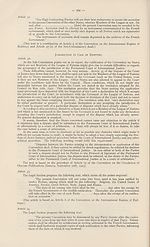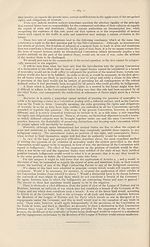Armament > Conference for the control of the international trade in arms, munitions and implements of war
(165)
Download files
Complete book:
Individual page:
Thumbnail gallery: Grid view | List view

— 163 —
“A denunciation shall +ake effect two years after the date on which the notification
thereof was received by the French Government and shall operate only in respect of
the notifying- State.”
(This text is a combination of Article 8 of the Convention on the International Regime of
Railways and Article 33 (1) of the Sub-Commission’s draft.)
Article 35.
“The High Contracting Parties agree that, at the conclusion of a period of five
years, the present Convention shall, in the light of the experience then gained, be subject
to revision upon the request of a third of the said High Contracting Parties.”
Annex.
Memorandum by the Legal Section of the Secretariat on the Question of the
Supply of Arms and Munitions by Neutral Countries to Belligerents.
Article 3.
Viscount Cecil proposed the following amendment:
It is hereby declared that nothing in this article shall affect the rule of inter¬
national law permitting the sale of munitions of war by the subject of a non-belligerent
State to the Government of a belligerent without breach of the neutrality of the non¬
belligerent State, and the grant of a licence under this article for such a sale shall not
be deemed to be a breach of neutrality.”
The effect of this amendment is to allow the High Contracting Parties the right of granting
licences without committing a breach of neutrality.
The legal difficulties raised by this amendment have been referred to the Legal Section.
The questions which that Section has to settle were expressed in the following terms:
T- Would the grant of a licence for export of arms to a belligerent be a breach
of neutrality by the granting Power ?
“2. If the answer to the first question is in the affirmative, would this result be
best prevented:
(i) ^7 a declaration in the Convention that such a breach of neutrality was
not to occur ? or
(ii) By a suspension of the operation of the Convention during war ?”
The following general principles are recognised by international law:
(1) It is contraiy to the obligations of a neutral State to supply munitions or
material of war of any kind either directly or indirectly to a belligerent Power on any
terms whatsoever.
(2) Further, a neutral Power is not bound to prevent the export or transit of arms
or munitions destined for any of the belligerents, nor does it bear any responsibility
for the sale of arms or munitions by its nationals to belligerents.
This last rule, which is based on the practice adopted by Governments and laid down in
the international Hague Conventions, was confirmed by the declarations of the Governments
during the late war. It leaves neutral States full freedom to allow their nationals to trade in
arms and munitions.
If the system established by the Convention on the traffic in arms is consistent with these
principles, they will still hold good and no special provision for that purpose is necessary.
It cannot be categorically laid down, however, that the system prescribed in the Convention
will not narrow the scope of the rule that neutral States bear no responsibility for the trade in
arms and munitions carried on by their nationals. It is impossible to foresee what influence the
new principles embodied in the Treaty will bring to bear on present standards of international
law. It can only be said that the Convention will introduce certain modifications in the system
regulating the international traffic in arms and munitions. The above rule as to neutrality is
based on the argument that a neutral Government is not called upon to interfere in the commercial
activities of its subjects and bears no responsibility in this respect. But could a belligerent State
in a future war, if it desired to prevent the exportation of arms or munitions from a neutral
country, contend that a neutral Government can no longer entirely ignore these exports, since
the new system introduces the principle of Government licences into international law and involves
action on the part of officials duly authorised for that specific purpose ?
If arms and munitions cannot be exported without an internationally recognised licence
issued by a Government authority, will not the neutral Government be more exposed to protests
and to pressure from belligerents ?
It is obviously impossible at present to answer these questions and any attempt to do so
would only lead to hypothetical and premature conclusions. It is possible, however, without
going so far as this, to realise, even at this juncture, that the application of the Convention
“A denunciation shall +ake effect two years after the date on which the notification
thereof was received by the French Government and shall operate only in respect of
the notifying- State.”
(This text is a combination of Article 8 of the Convention on the International Regime of
Railways and Article 33 (1) of the Sub-Commission’s draft.)
Article 35.
“The High Contracting Parties agree that, at the conclusion of a period of five
years, the present Convention shall, in the light of the experience then gained, be subject
to revision upon the request of a third of the said High Contracting Parties.”
Annex.
Memorandum by the Legal Section of the Secretariat on the Question of the
Supply of Arms and Munitions by Neutral Countries to Belligerents.
Article 3.
Viscount Cecil proposed the following amendment:
It is hereby declared that nothing in this article shall affect the rule of inter¬
national law permitting the sale of munitions of war by the subject of a non-belligerent
State to the Government of a belligerent without breach of the neutrality of the non¬
belligerent State, and the grant of a licence under this article for such a sale shall not
be deemed to be a breach of neutrality.”
The effect of this amendment is to allow the High Contracting Parties the right of granting
licences without committing a breach of neutrality.
The legal difficulties raised by this amendment have been referred to the Legal Section.
The questions which that Section has to settle were expressed in the following terms:
T- Would the grant of a licence for export of arms to a belligerent be a breach
of neutrality by the granting Power ?
“2. If the answer to the first question is in the affirmative, would this result be
best prevented:
(i) ^7 a declaration in the Convention that such a breach of neutrality was
not to occur ? or
(ii) By a suspension of the operation of the Convention during war ?”
The following general principles are recognised by international law:
(1) It is contraiy to the obligations of a neutral State to supply munitions or
material of war of any kind either directly or indirectly to a belligerent Power on any
terms whatsoever.
(2) Further, a neutral Power is not bound to prevent the export or transit of arms
or munitions destined for any of the belligerents, nor does it bear any responsibility
for the sale of arms or munitions by its nationals to belligerents.
This last rule, which is based on the practice adopted by Governments and laid down in
the international Hague Conventions, was confirmed by the declarations of the Governments
during the late war. It leaves neutral States full freedom to allow their nationals to trade in
arms and munitions.
If the system established by the Convention on the traffic in arms is consistent with these
principles, they will still hold good and no special provision for that purpose is necessary.
It cannot be categorically laid down, however, that the system prescribed in the Convention
will not narrow the scope of the rule that neutral States bear no responsibility for the trade in
arms and munitions carried on by their nationals. It is impossible to foresee what influence the
new principles embodied in the Treaty will bring to bear on present standards of international
law. It can only be said that the Convention will introduce certain modifications in the system
regulating the international traffic in arms and munitions. The above rule as to neutrality is
based on the argument that a neutral Government is not called upon to interfere in the commercial
activities of its subjects and bears no responsibility in this respect. But could a belligerent State
in a future war, if it desired to prevent the exportation of arms or munitions from a neutral
country, contend that a neutral Government can no longer entirely ignore these exports, since
the new system introduces the principle of Government licences into international law and involves
action on the part of officials duly authorised for that specific purpose ?
If arms and munitions cannot be exported without an internationally recognised licence
issued by a Government authority, will not the neutral Government be more exposed to protests
and to pressure from belligerents ?
It is obviously impossible at present to answer these questions and any attempt to do so
would only lead to hypothetical and premature conclusions. It is possible, however, without
going so far as this, to realise, even at this juncture, that the application of the Convention
Set display mode to:
![]() Universal Viewer |
Universal Viewer | ![]() Mirador |
Large image | Transcription
Mirador |
Large image | Transcription
Images and transcriptions on this page, including medium image downloads, may be used under the Creative Commons Attribution 4.0 International Licence unless otherwise stated. ![]()
| League of Nations > Armament > Conference for the control of the international trade in arms, munitions and implements of war > (165) |
|---|
| Permanent URL | https://digital.nls.uk/195383908 |
|---|
| Shelfmark | LN.IX |
|---|
| Description | Over 1,200 documents from the non-political organs of the League of Nations that dealt with health, disarmament, economic and financial matters for the duration of the League (1919-1945). Also online are statistical bulletins, essential facts, and an overview of the League by the first Secretary General, Sir Eric Drummond. These items are part of the Official Publications collection at the National Library of Scotland. |
|---|---|
| Additional NLS resources: |
|

